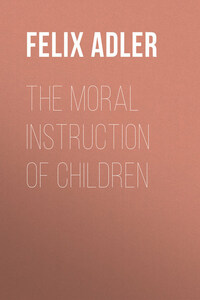Moral education is everywhere acknowledged to be the most important part of all education; but there has not been the same agreement in regard to the best means of securing it in the school. This has been due in part to a want of insight into the twofold nature of this sort of education; for instruction in morals includes two things: the formation of right ideas and the formation of right habits. Right ideas are necessary to guide the will, but right habits are the product of the will itself.
It is possible to have right ideas to some extent without the corresponding moral habits. On this account the formation of correct habits has been esteemed by some to be the chief thing. But unconscious habits – mere use and wont – do not seem to deserve the title of moral in its highest sense. The moral act should be a considerate one, and rest on the adoption of principles to guide one's actions.
To those who lay stress on the practical side and demand the formation of correct habits, the school as it is seems to be a great ethical instrumentality. To those who see in theoretical instruction the only true basis of moral character, the existing school methods seem sadly deficient.
The school as it is looks first after its discipline, and next after its instruction. Discipline concerns the behavior, and instruction concerns the intellectual progress of the pupil. That part of moral education which relates to habits of good behavior is much better provided for in the school than any part of intellectual education.
There is, however, a conflict here between old and new ideals. The old-fashioned school regarded obedience to authority the one essential; the new ideal regards insight into the reasonableness of moral commands the chief end. It is said, with truth, that a habit of unreasoning obedience does not fit one for the exigencies of modern life, with its partisan appeals to the individual and its perpetual display of grounds and reasons, specious and otherwise, in the newspapers. The unreasoning obedience to a moral guide in school may become in after life unreasoning obedience to a demagogue or to a leader in crime.
It is not obedience to external authority that we need so much as enlightened moral sense, and yet there remains and will remain much good in the old-fashioned habit of implicit obedience.
The new education aims at building up self-control and individual insight. It substitutes the internal authority of conscience for the external authority of the master. It claims by this to educate the citizen fitted for the exercise of suffrage in a free government. He will weigh political and social questions in his mind, and decide for himself. He will be apt to reject the scheme of the demagogue. While the old-fashioned school-master relied on the rod to sustain his external authority, he produced, it is said, a reaction against all authority in the minds of strong-willed pupils. The new education saves the strong-willed pupil from this tension against constituted authority, and makes him law-abiding from the beginning.
It will be admitted that the school under both its forms – old as well as new – secures in the main the formation of the cardinal moral habits. It is obliged to insist on regularity, punctuality, silence, and industry as indispensable for the performance of its school tasks. A private tutor may permit his charge to neglect all these things, and yet secure some progress in studies carried on by fits and starts, with noise and zeal to-day, followed by indolence to-morrow. But a school, on account of its numbers, must insist on the semi-mechanical virtues of regularity, punctuality, silence, and industry. Although these are semi-mechanical in their nature, for with much practice they become unconscious habits, yet they furnish the very ground-work of all combinations of man with his fellow-men. They are fundamental conditions of social life. The increase of city population, consequent on the growth of productive industry and the substitution of machines for hand labor, renders necessary the universal prevalence of these cardinal virtues of the school.
Even the management of machines requires that sort of alertness which comes from regularity and punctuality. The travel on the railroad, the management of steam-engines, the necessities of concerted action, require punctuality and rhythmic action.
The school habit of silence means considerate regard for the rights of fellow-workmen. They must not be interfered with; their attention must not be distracted from their several tasks. A rational self-restraint grows out of this school habit – rational, because it rests on considerateness for the work of others. This is a great lesson in co-operation. Morals in their essence deal with the relation of man to his fellow-men, and rest on a considerateness for the rights of others. "Do unto others," etc., sums up the moral code.
Industry, likewise, takes a high rank as a citizen's virtue. By it man learns to re-enforce the moments by the hours, and the days by the years. He learns how the puny individual can conquer great obstacles. The school demands of the youth a difficult kind of industry. He must think and remember, giving close and unremitting attention to subjects strange and far off from his daily life. He must do this in order to discover eventually that these strange and far-off matters are connected in a close manner to his own history and destiny.









